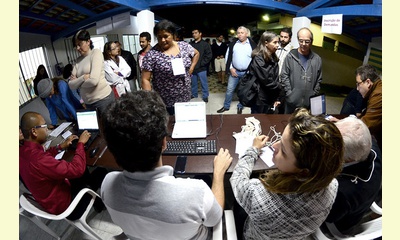|
|
Computerized voting system for Participatory Budgeting in Ubatuba, Brazil
un articulo por Portal R3
As of June 11, the municipality of Ubatuba has completed the
stage of plenary deliberations for Participatory Budgeting in
the eight regions of the city. The plenary sessions were a
success and brought together hundreds of citizens to present
their demands and elect councilors from each region. 
The plenary sessions were successful, bringing together hundreds of citizens to present their proposals and elect councilors from each region (Photo: Divulgação/PMU) *
click on photo to enlarge
Emphasis is placed on a computerized voting system for the
management of the process of Participatory Budgeting,
designed by a team of the Municipal Secretariat of Information
Technology as a contribution to the technological
development of the municipality.
The functions of the system include accreditation of citizen,
recording of the proposals, candidates for councilor and
compilation and instantaneous dissemination of voting
results.
The system was fully developed by the secretariat staff using
freely available programming languages, without the use of
third parties and without cost to the municipality.
According to Thiago Lamosa, Technical Director of
Infrastructure and the secretariat responsible for the system,
the project was designed to increase security and, especially,
to make the plenary sessions more efficient and transparent.
"
"With the new system, we are able to give each of the project
proposals and the counselor candidates equal importance,
publicity and attention," says Lamosa.
According to Peter Seno, municipal secretary of Information
Technology, the next step will be to make the system available
for voting on the Internet.
"We will make the system available on the Web to enable all
citizens of Ubatuba to participate in the process from their
home, work or community. Thus, we extend the process of
democracy and participation to reach all corners of the city."
*
(Click here for a Portuguese version of this article)
|








|
DISCUSSION
Pregunta(s) relacionada(s) al artículo :
Participatory budgeting, How does it work?
* * * * *
Comentario más reciente:
:
This discussion question applies to the following articles:
Paraná, Argentina: vecinos votaron las propuestas para Presupuesto Participativo
Paraná, Argentina: residents will vote on proposals to implement through the Participatory Budgeting Process
The municipality of Alcoutim, Portugal, launches Participatory Budgeting
Alcoutim lança Orçamento Participativo Municipal [Portugal]
Participatory Budget 2014: Sunday will be the vote [Trenque, Argentina]
Presupuesto Participativo 2014: el domingo será la votación [Trenque, Argentina]
No reason to fear the people: Participatory budgeting in Brazil
Sem medo de povo: Orçamento Participativo no Brasil
Computerized voting system for Participatory Budgeting in Ubatuba, Brazil
Sistema informatizado de votação para Orçamento Participativo é destaque em Ubatuba, Brasil
Participatory Budgeting for Youth in Rosario, Argentina
Presupuesto Participativo Joven – Rosario, Argentina
3.500 personas participaron en etapa de diagnóstico del Programa Presupuesto Participativo [La Serena, Chile]
3,500 people take part in the diagnosis stage of participatory budgeting in La Serena, Chile.
For more recent articles and discussion, click here.

|
|









